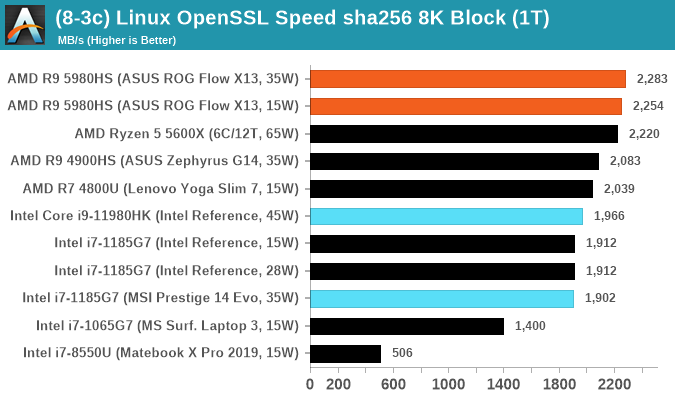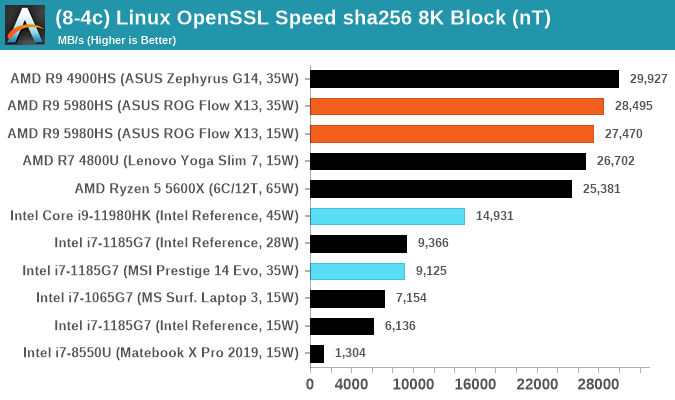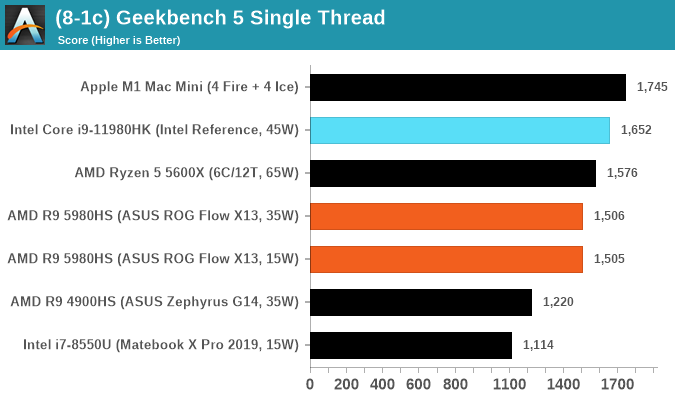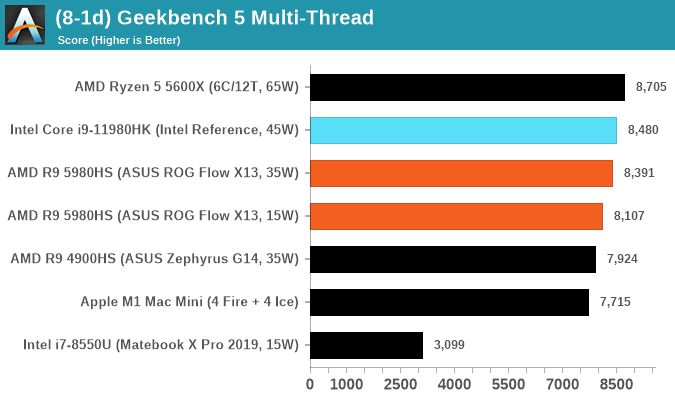Intel 11th Generation Core Tiger Lake-H Performance Review: Fast and Power Hungry
by Brett Howse & Andrei Frumusanu on May 17, 2021 9:00 AM EST- Posted in
- CPUs
- Intel
- 10nm
- Willow Cove
- SuperFin
- 11th Gen
- Tiger Lake-H
CPU Tests: Synthetic
Most of the people in our industry have a love/hate relationship when it comes to synthetic tests. On the one hand, they’re often good for quick summaries of performance and are easy to use, but most of the time the tests aren’t related to any real software. Synthetic tests are often very good at burrowing down to a specific set of instructions and maximizing the performance out of those. Due to requests from a number of our readers, we have the following synthetic tests.
Linux OpenSSL Speed: SHA256
One of our readers reached out in early 2020 and stated that he was interested in looking at OpenSSL hashing rates in Linux. Luckily OpenSSL in Linux has a function called ‘speed’ that allows the user to determine how fast the system is for any given hashing algorithm, as well as signing and verifying messages.
OpenSSL offers a lot of algorithms to choose from, and based on a quick Twitter poll, we narrowed it down to the following:
- rsa2048 sign and rsa2048 verify
- sha256 at 8K block size
- md5 at 8K block size
For each of these tests, we run them in single thread and multithreaded mode. All the graphs are in our benchmark database, Bench, and we use the sha256 results in published reviews.


GeekBench 5: Link
As a common tool for cross-platform testing between mobile, PC, and Mac, GeekBench is an ultimate exercise in synthetic testing across a range of algorithms looking for peak throughput. Tests include encryption, compression, fast Fourier transform, memory operations, n-body physics, matrix operations, histogram manipulation, and HTML parsing.
Unfortunately we are not going to include the Intel GB5 results in this review, although you can find them inside our benchmark database. The reason behind this is down to AVX512 acceleration of GB5's AES test - this causes a substantial performance difference in single threaded workloads that thus sub-test completely skews any of Intel's results to the point of literal absurdity. AES is not that important of a real-world workload, so the fact that it obscures the rest of GB5's subtests makes overall score comparisons to Intel CPUs with AVX512 installed irrelevant to draw any conclusions. This is also important for future comparisons of Intel CPUs, such as Rocket Lake, which will have AVX512 installed. Users should ask to see the sub-test scores, or a version of GB5 where the AES test is removed.


To clarify the point on AES. The Core i9-10900K scores 1878 in the AES test, while 1185G7 scores 4149. While we're not necessarily against the use of accelerators especially given that the future is going to be based on how many and how efficient these accelerators work (we can argue whether AVX-512 is efficient compared to dedicated silicon), the issue stems from a combi-test like GeekBench in which it condenses several different (around 20) tests into a single number from which conclusions are meant to be drawn. If one test gets accelerated enough to skew the end result, then rather than being a representation of a set of tests, that one single test becomes the conclusion at the behest of the others, and it's at that point the test should be removed and put on its own. GeekBench 4 had memory tests that were removed for Geekbench 5 for similar reasons, and should there be a sixth GeekBench iteraction, our recommendation is that the cryptography is removed for similar reasons. There are 100s of cryptography algorithms to optimize for, but in the event where a popular tests focuses on a single algorithm, that then becomes an optimization target and becomes meaningless when the broader ecosystem overwhelmingly uses other cryptography algorithms.










229 Comments
View All Comments
Bbdffd - Tuesday, May 18, 2021 - link
I think AMD still not able to defeat intel in Gaming even with their 7nm processor (5980hs).Cooe - Thursday, May 20, 2021 - link
"The performance lead against AMD’s strongest mobile CPU, the 5980HS"The 35W R9 5980HS is NOT AMD's strongest mobile CPU Brett. That would be the 45W unlocked & higher clocked R9 5980HX. I expect better from AnandTech... -_-
Spunjji - Thursday, May 20, 2021 - link
It is a little bit complicated... the 5900HX appears to beat the 5980HS by a little way in multi-thread tests but fall behind in single-thread, and if you look at things in performance-per-watt terms the 5980HS is easily the strongest. There's also the fact that there don't seem to be any shipping devices with the 5980HX in them. Strange times.ottonis - Friday, May 21, 2021 - link
So well, according to Intel's advertising materials, their new 11th gen Tiger Lake based 8c mobile CPUs were supposed to wipe the floor with AMD.Well... not really, according to this review, at least not within the same power consumption envelope and in multicore tasks.
block2 - Monday, May 24, 2021 - link
Running Intel at 35w if possible would be interesting.Unclear on quick read if external GPUs were disabled so that these tests aren't in reality a GPU test.
JayNor - Friday, May 28, 2021 - link
news out today in tomshardware that there is a B series of the 8 core TGL that boosts to 5.3GHz. This is even for parts with the GPU ...mode_13h - Saturday, May 29, 2021 - link
About right, for a desktop CPU.Makste - Monday, May 31, 2021 - link
This is a NUC part, not a laptop part.mode_13h - Tuesday, June 1, 2021 - link
Not really. NUCs normally use the U-series notebook CPUs. That's all a NUC is -- a notebook CPU in a compact enclosure.NUC Extreme is something completely different. They're more like a normal desktop PC, and the latest NUC Extreme that Intel just announced is the one that will use these H-series CPUs.